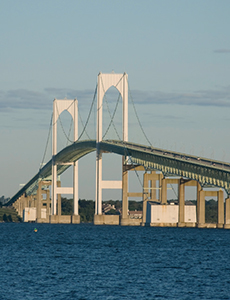The Law
Legal Spotlight

A Test of Good Faith
In 2010, Abhe & Svoboda (A&S) were contracted to paint and repair the Pell Bridge over the Narragansett Bay in Rhode Island.
A severe nor’easter on Oct. 29, 2011 sunk SEI-34, one of two barges being used for the work.
A&S contracted with Donjon Marine Co. Inc. to remove the wreck, but Donjon did not complete the work, forcing A&S to retain new companies to finish the job.
St. Paul Fire & Marine Insurance Co., which provided a marine hull and protection and indemnity insurance policy to A&S, had negotiated the contract with Donjon, and prepaid half of the payment due.
Donjon pursued A&S for the remainder, seeking an arbitration hearing. St. Paul declined A&S’s request for defense and indemnification, citing A&S’s failure to disclose a 2010 surveyor report that noted pinholes in SEI-34’s deck, and mud, sand and water in some tanks.
The arbitrators concluded that Donjon breached its contract and awarded A&S $665,351 in damages.
Acting on a lawsuit filed by St. Paul, the U.S. District Court for the District of Minnesota-Minneapolis upheld the insurer’s request that it had no duty to defend or indemnify.
A&S appealed to the U.S. 8th Circuit Court of Appeals. It argued the district court erred when it concluded A&S breached its duty of good faith under the doctrine of uberrimae fidei (“utmost good faith”) by failing to disclose SEI-34 when it initially purchased insurance.
The barge, valued at $225,000 by the insured, was listed during the renewal process, on May 3, 2011. When the insurer initially provided the policy, it had accepted a schedule of vessels that had been used by the prior insurer.
The court ruled that failure to disclose by itself was insufficient. There must be a causal connection between the omission and the issuing of the contract.
The case was returned to the lower court for a determination of whether the undisclosed information was material to the issuance of the policy, whether the barge was suitable for its use despite its faults, and whether SEI-34 was over-valued for insurance purposes.
Scorecard: The insurer may be responsible for $225,000 for loss of the barge as well as overhead items, including salaries, overtime and other damages.
Takeaway: Similar to general contract law, an omission in uberrimae fidei coverage has no legal effect unless there is a causal connection to the insurer’s decision to bind the risk.
$3.5 Million to Settle Well Dispute
In August 2008, the Viking No. 1 well in Lavaca County, Texas, suffered an underground blowout, and its operator and owner, Weiser-Brown Operating Co., lost control of the well.
After Weiser-Brown notified St. Paul Surplus Lines Insurance Co. that it would be making a claim on its control-of-well policy, the insurer’s loss adjuster, BC Johnson, requested 17 categories of information, including daily drilling reports, the joint operating agreement and “invoice cost documentation.”
Most of that information was sent within one month. On Sept. 29, 2009, BC Johnson reached a preliminary conclusion that “there was not a subsurface loss of control.” Additional information was requested, and on Feb. 8, 2010, Weiser-Brown was informed that Viking No. 1 was never out of control, which became a major dispute between the insured and insurer.
On July 16, 2010, Weiser-Brown filed suit against St. Paul, and a jury awarded the oil operator $2.3 million in damages for breach of contract and $1.2 million in penalty interest for the insurer’s failure to abide by the Texas Prompt Payment of Claims Statute.
St. Paul appealed to the U.S. 5th Circuit Court of Appeals, contending it did not violate the Prompt Payment Statute, or that alternatively, the wrong date was used to begin accruing 18 percent interest on the damages awarded. Weiser-Brown cross-appealed, claiming that it’s bad faith claim against the insurer should not have been dismissed.
On Sept. 16, 2015, the appeals court upheld the lower court rulings. It ruled the insured had complied with most of the requests for information by Nov. 6, 2009, and that interest would begin accruing 15 days from that date (the time period specified by the Prompt Payment Statute) to accept or reject the claim.
It also ruled that the lower court properly dismissed the bad faith claim because there was a bona fide coverage dispute.
Scorecard: The insurer must pay $3.5 million to its client.
Takeaway: The court ruled that determination of prompt payment “will depend on the facts and circumstances involved in a given case.”
Insurer Loses Duty to Defend Suit
In March 2006, Joseph Boyle was asked by a co-owner of C&N Corp., an auto repair shop in Massachusetts, to check out his truck’s condition while it was on a lift in the shop. As he did so, one of the truck’s tires exploded, severely lacerating and fracturing Boyle’s left arm and hand.
Boyle incurred about $106,000 in medical expenses, and suffered permanent scarring and partial loss of function in his left arm and hand. He was out of work for about a year and eventually had to take a lower-paying, less-skilled job than he held before the accident.
C&N informed Zurich American Insurance Co., which had issued a business auto policy that included liability coverage, of the accident, but not of the subsequent lawsuit filed against it — although Boyle’s attorney did notify the insurer. The policy had a coverage limit of $50,000.
Zurich did not respond to the attorney’s request for information and never defended C&N against the litigation.
C&N, which went out of business, never responded to Boyle’s lawsuit and in October 2009, a judge awarded a default judgment of $1.5 million damages to Boyle and $750,000 to his wife, Janice.
Although Zurich had been sent a notice of a hearing on the default judgment, it did not appear in court as an office clerk apparently just filed the paperwork and never passed along the information.
In June 2011, the Boyles, as assignees of the C&N policy, filed suit against Zurich for breach of duty to defend and violation of the state’s consumer protection statute. Before the case came to trial, a settlement of $1.3 million was reached, and the Boyles relinquished any claims “in their individual capacities.”
A trial was held on the remaining claims, and the Superior Court judge ordered judgment against Zurich in the amount of $2.25 million for failure of duty to defend. The court, which ruled Zurich did not violate the state’s consumer protection law, said the $1.3 million settlement should be subtracted from that amount. Both sides appealed.
The state’s Supreme Judicial Court said damages should not be reduced by the settlement as the settlement was related to the Boyles’ individual claims, while the $2.25 million in damages related to its claims as assignees of the policy held by C&N, which had been wronged by Zurich’s failure to settle the lawsuit earlier.
Scorecard: Zurich must pay an additional $2.25 million to the couple.
Takeaway: Failure of the insured to notify its insurance company of litigation does not negate the duty to defend since it did not suffer prejudice from the failure.












